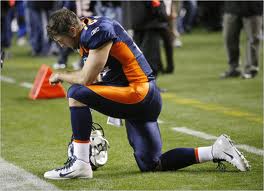

Does Tim own Tebowing?
Kurt Leyendecker //November 9, 2012//
Has a trademark taken Tebowing off the table?
The short answer: No. Neither Tim Tebow nor any business entity with which he is involved owns a trademark on his signature move.
Interestingly, headlines just a week or so ago may have indicated otherwise. The opening line of the widely carried AP story reads, “Dropping to a knee like Tim Tebow might cost you now.” And an article on Yahoo Sports proclaimed, “We can argue that the intention of prayer shouldn’t be a copyrighted exercise, but Tebow’s legal and business acolytes would clearly disagree.” That particular author went on to write, “Genuine gesture or patent offense? The latter, we suppose.”
This kind of misreporting as it pertains to trademark law frustrates intellectual property attorneys, though maybe it shouldn’t. So long as lay people don’t understand intellectual property law and don’t know the difference between trademarks, patents and copyrights, my job is safe. And having a safe job in this economy is nothing to scoff at.
However, let’s set the record straight.
Tim Tebow’s marketing company XV Enterprises LLC, filed a number of trademark applications last year to protect use of the word, “Tebowing” to identify a number of products. The application pertaining to the use of the mark to identify hats, shirts and t-shirts has been approved by the United States Trademark Office, and barring some unforeseen event, should issue in the next month or two. Once issued, selling t-shirts under the Tebowing name by anyone but Tebow himself will be infringement of a federally registered trademark.
Trademarks protect words and logos, often referred to as brand names, used to identify a product or a commercial service. They exist to prevent unscrupulous parties from trading off on the goodwill associated with a particular product or service as developed by another company. Imagine if there were no trademarks and every soft drink company was able to call their cola, Coco Cola, and package it in the same manner as the real thing. When you went to buy a Coke, you wouldn’t be able to ascertain whether or not the cola on the shelf was the drink you know and love or some foul tasting knock off. Thankfully, because of trademarks, when you want a Coke and you buy a Coke, you can rest assured that it is a Coke.
Trademarks do not and cannot lock up the rights to non-commercial expression. They can’t prevent someone from selling a particular product or offering a particular service. They can only prevent people from using a particular name or logo to identify a product or service. Copyrights on the other hand can protect expression, but only an expression that is fixed in a tangible medium.
The act of Tebowing is not fixed in a tangible medium just as your strumming of Stairway to Heaven as you attempted to play the guitar so many years ago was not an infringement of Led Zepplin’s copyright. The act of Tebowing isn’t protectable by patent either, which requires a patentable method to be useful and have a tangible non-abstract result. While those partaking in Tebowing might take exception to any determination that the act is not useful, patent law is interpreted in relation to our physical existence and not benefits received or felt ethereally.
The moral of the story? When you buy that Tebowing baseball cap, you can rest assured it’s backed by the original Tebower himself. And if this makes you want to fall down on one knee in prayer, feel free, because no one is going to stop you.
























